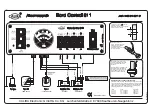
Driving and operation
101
Fuels, refuelling
Fuel c onsum ption
Optional equipment (e.g. wide tyres, a ir
conditioning system , towing equip ment)
increases the kerbw eight and in some
cases also the p ermissible Gross Vehicle
Weight. This in turn increases fuel
consump tion and reduces the maxim um
speed of the vehicle.
When the vehicle is new, there is increased
friction b etween the engine and
transm ission com ponents la sting for
several thousand m iles / kilom etres. This
increases fuel consumption.
Fuel for petrol engines
Commercially av ailable high-quality fuel
with a maximum ethanol content of 5% as
per DIN EN 228 (catalytic converter -
see p age 104, octane numbers -
see page 164). Fuel quality has a decisive
influence on power output, running
behaviour and serv ice life of the engine.
The additives contained in the fuel play an
important role in this regard. You should
therefore only use high-q uality fuels
containing add itiv es.
Fuels with ethanol content greater than 5%
do not comply w ith DIN EN 228 a nd must
not b e used unless the v ehicle ha s b een
specifically develop ed a nd approved for
use of such.
Fuel with too low an octane number can
cause pinking. Vauxhall cannot be held
lia ble for resulting dama ge.
Petrol with a higher octane number can
always be used.
Filler nozz les for leaded fuel cannot b e
inserted into the filler neck of v ehicles that
op erate on unleaded fuel.
The ignition tim ing is a utoma tica lly
adjusted according to the grade of fuel
used (octane number) – see page 164.
Use of petrol w ith a n oc ta ne rating of 95
will ensure economica l driving.
Fuel for diesel engines
Diesel engines m ust be operated only on
comm ercially av ailable diesel fuel meeting
the specifications of DIN EN 590.
Since Ja nuary 2004, some oil comp anies
have mixed their diesel fuel with up to 5%
Bio fuel (FAME = Fatty Acid Methyl Esters)
like RME (Rape-Oil Methyl Ester). This is in
acc orda nce with the current DIN EN 590
and d oes not ha rm the fuel injection
system. The characteristics of a diesel fuel
mixed up with 5% Bio fuel (FAME) do not
differ from conventional diesel fuel and do
not influence the vehicle’s driveability.
Importa nt:
Diesel fuel m ixed with 5% FAM E
acc ording to DIN EN 590 m ust not be
confused with 100% Bio-Diesel, which is not
to be used in Vauxhall eng ines.
The flow and filterability of diesel fuel a re
temperature-dependent.
Diesel fuels w ith improved low temp erature
properties are therefore a vailable on the
ma rk et during the winter months. Make
sure that you fill the tank with winter fuel
before the start of the cold weather
season.
Additives can be used with diesel fuels with
winter prop erties that are guaranteed by
the manufa cturer and when using diesel
fuel filters that are heated depending on
the outside temperature.
Diesel fuels must not be diluted with fuels
that are intended for petrol eng ines.
















































